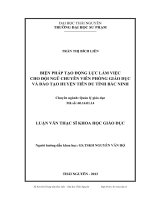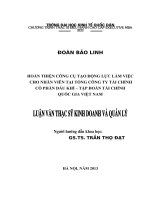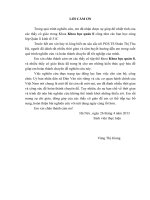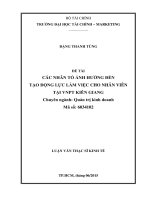BÀI tập TÌNH HUỐNG tạo động lực làm việc – e
Bạn đang xem bản rút gọn của tài liệu. Xem và tải ngay bản đầy đủ của tài liệu tại đây (47.81 KB, 7 trang )
BÀI TẬP TÌNH HUỐNG
Tạo động lực làm việc –
Nowadays, with the stormy development of society, growing economy is growing,
competition is fiercer, and enterprises have to face a situation that is finding out, creating
and retaining talent. To do this, managers need to know to create a driving force for his
subordinates.
Promotion is a psychological process which takes place due to the direction and purposed
effects of human. In corporate governance activities, promotion is the targeted impact of
the enterprise in order to motivate employees to improve performance and help them to
complete tasks in an effective manner.
Motivation is the commitment, the labor of man. When driven in a certain situation,
people will get the commitment of all his work, along with all the strength and wisdom.
Typically employees only have real commitment and dedication to the job when they get
personal satisfaction. Motivation is a problem which is rather vague, unclear and difficult
to identify by empirical research. However, administrators can create incentives for
employees when they are motivated.
The same can be said, in any business, employees also need to find the motivation to
work. Therefore the study of motivation to motivate employees in the enterprise is
essential for any business in the current era.
1. According to Herzberg's two factor theory, to motivate employees include the
following two factors:
- Promoting factor: These are the elements of the work, including the factors that make
up satisfaction, achievement, recognition, achievement, self in the work of the employee,
the responsibilities and functions of labor, the promotion. This is the basic needs of
workers participating in work. Characteristics of this group are that if not satisfied, will
lead to dissatisfaction, if satisfied, will motivate employees to work.
1
- Maintenance factor: These are the elements of the work environment of employees, the
policy, and administration mode of business, wages, work instruction, human relations,
and the working conditions. These factors, if well-organized, have the effect of
preventing dissatisfaction with the work of the employees.
According to Herzberg: Salary is one of the elements in the group of maintaining and
motivating employees. The wages generally do not have effect of motivating staff despite
the unpaid wages can make workers become dissatisfied. However, salary is an extremely
important factor when employees feel their salary is not satisfactory.
In this case, the all three staff Thanh, Tuan, Ngoc are not satisfied with their salary, Mai
use plan of increasing their salary significantly. Immediate short-term effect is that the
three employees will be accepted to stay working for Mai.
However, if Mai only use this option to retain and bring satisfaction to its employees is
not enough because of among her employees – Tuan, is bored at work. According to
Herzberg, besides the element of wages, the administrator must use the other elements of
the maintenance team to meet the needs of workers. In addition, factors of satisfying
employees are different with the factors that create discontent. So, Mai cannot expect
satisfaction of employees by simply removing the cause of the discontent. Encouraging
staff here requires Mai satisfactorily resolve, balance both groups of factors is to maintain
and encourage, not to focus on any individual factor. However there is a problem that can
happen is: whether employees’ satisfaction at work does not necessarily bring higher
work performance. Thus, if Mai decided to increases wage significantly for her
employees, this is considered only a temporary solution, but do not promise to radically
solve the problem, not help her make motivation and promoting employees in the long
term.
2. For job enrichment or making job more sense, Mai can use methods such as:
- Let each employee see the entire job, from start to finish, not divide the work into small
tasks.
2
- Increase the level of responsibility for work whenever and wherever possible.
- Reduce the level of supervision, and allow employees control approaches to the work,
the necessary equipment more.
- Expand the types of tasks that the administrator assigned to the employee.
- Create opportunities for each employee to become proficient in a particular task or
activity areas.
- Find ways to expand the scope of work that Mai and her group are responsible.
- Ensure that the work is meaningful and staff are aware of that.
3. Using these methods of job enrichment can bring some certain effects for Mai:
First, employees of Mai will feel more interested in the job and see the meaning of the
work they are doing.
Second, the increased level of responsibility in the work of the staff make employees
work more carefully, be more responsible, because if they do wrong, they will be more
responsible.
4. In the process of applying the method to enrich the work of her travel agent, Mai can
precede the following changes to enrich the work of two tellers:
- Increase the diversity of skills to work by increasing the number of more complex tasks
in a certain period of time. These tasks are designed to create opportunities for employees
to develop skills and abilities that have not been used up. However, the results of the
work have to be seen.
- Improving the importance of work: job design is so important, that is the result of the
work will affect others (today many businesses encourage employees to consider their
colleagues as client in work, and this is consistent with the purpose of raising the
importance of the work).
3
- Consider the assignment of new task as an opportunity rather than a requirement. This
allows employees have the option to take any task and at any time. Employees will get
more complex tasks when they have enough ability to perform.
- Give employees and departments more autonomy: allowing flexibility in way to
proceed, check and coordinate the work. You may have heard the word “grant”, which
means that the manager comes back into the scenes and gives the team the right to selfmanagement.
- Establish mechanisms to ensure feedback quickly and directly.
The work design under way to enrich the work should be linked to Maslow's theory: one
would not expect to meet the higher demand if the basic needs are unmet. Note
Herzberg's theory: maintenance elements can affect work motivation. Expectations theory
reminds managers to let staff see themselves: 1. the relationship between effort and
results of the work, and between the results of the work with praise; 2. Reward is
equitable; 3. Valuable rewards.
5. To be able to motivate his staff, Mai first need to find out the cause of the job
satisfaction of her employees.
- Firstly, the general reason is Mai’s staffs were not satisfied with the current salary. The
main reason causing this dissatisfaction can be easily seen when Mai uses the weighted
average method, all the money that customers reward the company's employees were
pooled and divided among three employees at the end of the month. With the current
policy, all employees, whether to do more, or less, have the same reward. This gives the
staffs a psychological dissatisfaction; they do not want to engage their best work.
- Secondly, Tuan has been bored at current job. Depression of Tuan may be due to the
following reasons:
+ Loss of direction or control of all aspects of work.
4
+ The aspirations are not achieved.
+ Deprived responsibility.
+ Disagreements with superiors or colleagues.
+ Current policies or regulations of the business are not the same as his expect.
+ Safety at work can be threatened.
+ Superior does not trust when assigning work.
After having figured out the cause leading to the employees’ satisfaction, Mai could use
some of the following changes in addition to changes in wages that Mai had promised to:
- Bonus: In addition to the basic salary, she should reconsider bonuses for employees,
who do effectively will get high-reward, low efficiency - winning little or no reward. In
addition to material bonus, she can use the spiritual rewards as: encouragement reward,
gifts in kind.
- The changes in training: Ms. Mai should allow employees to participate in courses,
seminars, professional organizational night situations, business games to improve their
skills as professional skills, communication skills, skills to participate in collective
activities ... This is a change that can help Mai resolve customers’ complaints about
service and transactions quality.
- Empowering and authorizing staff: Currently, Mai has allocated each work array for
employees, but they do not have the right to decide their work to do, but all must be
through her. This prevents employees from seeing their responsibilities and rights in the
work they do. To promote employees, she should empower their subordinates in order
that they see their responsibilities as well as rights, and then they will dare to venture into
the job with a higher sense of responsibility.
5
- Use the methods of job enrichment or making job more sense. In order to do this, Mai
should redesign the work and the workplace, so that her staff will:
+ be more responsible.
+ be able to control more of his work.
+ Have more feedback.
In this case, Mai can use methods such as:
+ Enhance the fun of the work by authorizing the whole array of work for her employees.
For example, Tuan is dedicated package to tours so he should directly meet and design
tour for them, not necessarily all solved by Mai.
+ Swaps the position of everyone to have the opportunity to develop more.
+ Ask employees to propose and let them carry out.
Motivating employees is an issue whose role is becoming more and more important in
human resource management policies of each company. Well-done work of motivation
will make workers eager to work, strive to improve the production efficiency of the
enterprise business. On the other hand, when the company's policy is reasonable, meet
the needs of the employees, the employees will be comfortable to work in a long time.
Therefore, in any case, managers also need to consider the problem of motivating his
employees; when seeing the motivation, employees will work more accountably and be
more engaging. This increases efficiency and work productivity, helping administrators
achieve the goals they set out.
6
REFERENCES
1. Nguyễn Hải Sản (2007), Giáo trình Quản trị học, NXB Thống kê.
2. Stephen P.Robbins, Timothy A. Judge (2008), Hành vi tổ chức, NXB Lao động xã hội.
3. Philip Kotler (2007), Marketing management , Prantice Hall International.
7









